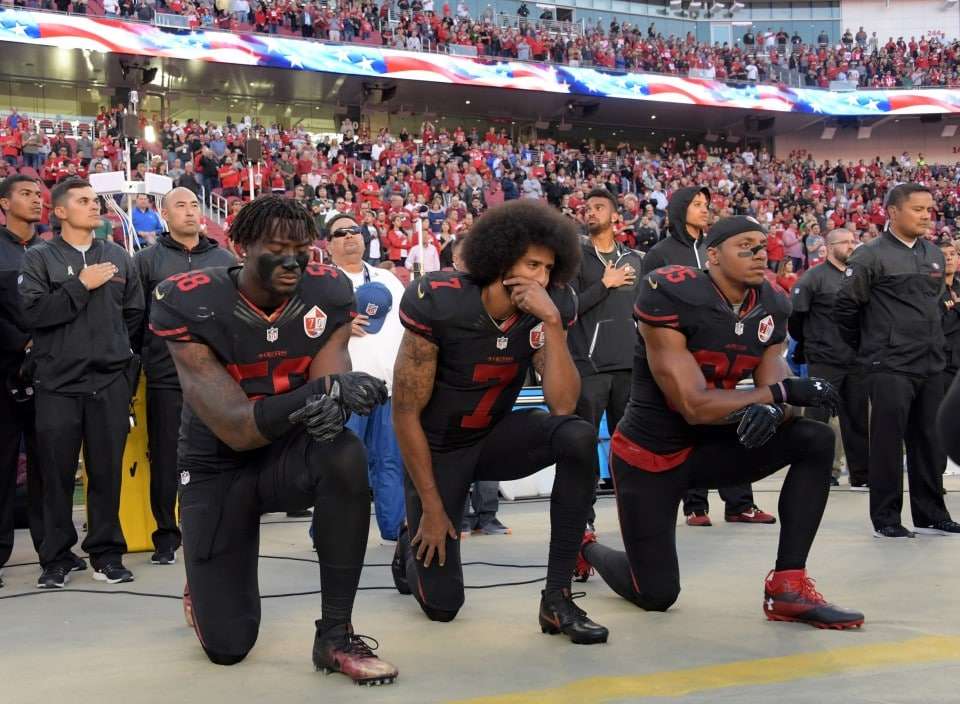The Volokh Conspiracy
Mostly law professors | Sometimes contrarian | Often libertarian | Always independent
Why political protests during the national anthem are so offensive to so many

"In Memory of the Men of Yale who true to Her Traditions gave their Lives that Freedom might not perish from the Earth."
So reads the World War I memorial on the Hewitt Quadrangle (a.k.a. Beinecke Plaza) in the heart of the Yale University.
Because the Hewitt Quad is in the middle of Yale's campus and is the location of Woodbridge Hall which houses the university president's and corporate offices, it is often the site of political protest and politically motivated displays.
During the 1980s, when many activists sought to encourage university divestment from corporations doing business in South Africa, numerous protests were staged on the Hewitt Quad. During one, protesters draped an African National Congress flag over the war memorial, covering its dedication. To many observers, this act, however inadvertently, overshadowed the protesters' message. Whether the protesters realized it or not, covering the war memorial turned an anti-apartheid demonstration into the defacement of a solemn place. This may not have been what the protesters intended, but it is the message many received.
The current conflagration over NFL national anthem protests reminded me of the Hewitt Quad controversies because I suspect the same dynamic is at play.
Just as many members of the Yale community - alumni and veterans especially - saw the war memorial as a sacred remembrance of a debt owed, many Americans see the national anthem, and the ritualistic presentation of the flag at sporting (and many other) events, as a sacred remembrance of those who have given their lives for the freedoms we share and the principles to which this nation aspires.
However well-intentioned or justified a given protest may be, when political protests occur during the national anthem, many Americans see a defacement of something sacred - and this message completely overshadows the intended content of the protests. As experienced and understood by many, the protesters were not merely seeking to advance their own cause; they were advancing their cause at the expense of something of transcendent importance to many others.
To be clear, my claim is neither that this is what anthem protesters intend nor that this is the "best" interpretation of their acts. (Indeed, I share many of the protesters' concerns about persistent racial inequality and the problem of police misconduct.) I am merely making a claim about how these protests are perceived and understood by a sizable share of their audience. The protests occur during the anthem and therefore, in the eyes of many viewers, detract or distract from the anthem and the message it is meant to convey.
However much some protesters insist that they are not intending to protest the country or the flag (and certainly that they have no intention to protest the troops who serve for the benefit of the rest of us), this message is inevitably lost on a certain share of the audience. After all, some might claim, if the point is not to protest the nation or the flag, why not hold the protest at some other time? (The obvious answer is that if done at another time, it would not attract the same attention, and there's the rub.)
Perhaps all this was understood when the protests began - perhaps there was a calculated judgment that the platform a pregame protest provides outweighed the risk of confusing the message - but I am not so sure. Some protesters seem genuinely surprised at the pushback their actions have engendered, and I take them at their word.
This episode, like that on the Hewitt Quad, is a reminder that the messages we intend are not always the messages that are received. In these highly polarized times, this is true more than ever. Scroll through Twitter and you will see those attacking the protests and those defending the protests frame the entire controversy in wholly different terms. Different groups of people are talking about the same event but experiencing it in radically different ways - but unless and until either or both are willing to consider the other's perspective, no real communication can take place.
Whichever tribe you prefer in this controversy is beside the point. On both sides are Americans with a stake in our common civic project. If we can't learn to understand what motivates, excites - and, in this case, enrages - those on the other side, we won't be able to communicate about the things that really matter.


Show Comments (0)